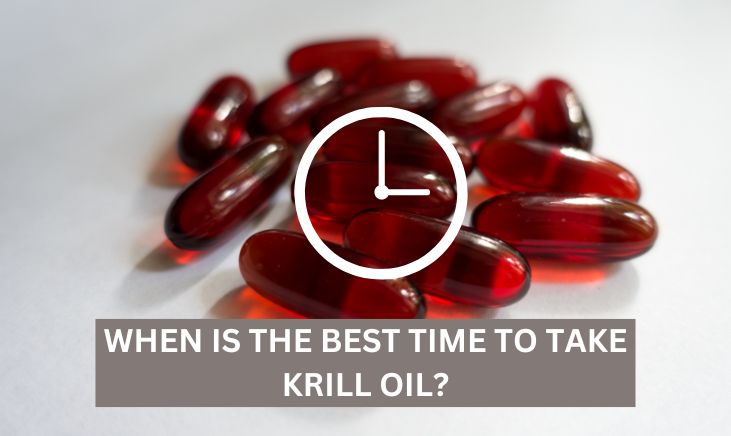So when is the best time to take krill oil? The short answer to this question is that there is no perfect time to take an omega-3 supplement like krill oil. However, taking it alongside a meal containing healthy fats is best.
Krill oil, not to be conflated with fish oil, is a potent source of omega-3 fatty acids renowned for its myriad of health benefits.
Whether you’re targeting heart health, seeking cognitive enhancement, or pursuing joint relief, taking a daily omega-3 supplement may be beneficial.
As always, any dietary supplement is not meant to replace real food but to be used in addition to a healthy balanced diet and regular physical activity.
Be aware that dietary supplements are not regulated by the Food and Drug Administration (FDA) and may interact with certain medications. Therefore, it’s always a good idea to consult your doctor before starting a new supplement regimen.
Table of Contents
Short Summary
- Omega-3 supplements like krill oil are best absorbed when consumed alongside a meal that includes other healthy fats.
- It’s much more important to focus on getting the right omega-3s in your diet rather than getting the timing perfect for taking your krill oil supplement.
- Taking krill oil offers advantages such as energy/cognitive enhancement, inflammation reduction, sleep quality improvement, and joint pain relief.
Krill Oil Overview
Many people may be much more familiar with fish oil or cod liver oil to supplement omega-3 fatty acids. People who have been taking fish oil are increasingly interested in krill oil primarily because krill oil has fewer side effects, like a fishy aftertaste or belching. Krill oil is harvested from tiny crustaceans residing in Antarctica’s oceans. Fish oil, on the other hand, comes from fatty fish like salmon and cod.
Omega-3s are a group of fatty acids composed of alpha-linolenic acid (AHA), eicosapentaenoic acid (EPA), and docosahexaenoic acid (DHA). Our bodies don’t make these nutrients, and many Americans do not consume enough EPA or DHA through diet alone, so sometimes supplementation is encouraged. EPA/DHA benefits a range of health outcomes, from brain health to lowering blood pressure.
While fish oil serves this purpose, it’s recently come to light that krill oil may be a preferred alternative to fish oil. Compared to a fish oil supplement, krill oil may have greater anti-inflammatory properties since it contains the antioxidant anthaxin, which gives krill oil its reddish color.
There are many krill oil supplements to choose from. However, they may be harder to find and a bit pricer than fish oil supplements.
Bioavailability of Krill Oil
The bioavailability of krill oil depends on meal composition, timing, and possible interactions with other medications. Bioavailability is how effectively a substance is absorbed and utilized by the body. Omega-3 supplements are more bioavailable when taken alongside a meal containing healthy fats.
Nutrient timing for omega-3 supplements isn’t actually uber important, as long as you time your supplementation regimen around meal time. For example, those who prefer to take all their medications and supplements in the morning should also eat a breakfast that includes healthy fats shortly before or after taking their supplements.
Both fish oil and krill oil lower blood lipids, but krill oil may have better bioavailability than fish oil. Researchers hypothesize that this is because the fatty acids in krill oil are phospholipids rather than triglycerides found in fish oil.
These are both lipids, but phospholipids are more soluble in water than triglycerides, making them more easily absorbed by the body. However, there isn’t much substantial research yet to know whether krill oil has beneficial properties over fish oil supplementation in this respect.
Some medications can also interact with bioavailability. This doesn’t always cause harm but can make your supplement less effective. Again, suppose you take medication for a pre-existing health condition. In that case, you’ll need to check with a qualified health professional to determine whether or not you should take krill oil supplements.
Why Should You Care?
If you’re spending the money and taking the time to purchase and consume krill oil supplements (and frankly, read this article), then you should make it a point to take your krill oil when and how it will be most effective. You won’t experience the benefits of krill oil mentioned above if you’re body can’t absorb it.
Consistency is Key
As with many things related to health and fitness, consistency is how we see results. There are no observed acute benefits of omega-3 supplementation, meaning it doesn’t have immediate effects.
The benefits of omega-3 fatty acids are achieved over time. This is the main reason why timing is less critical for krill oil.
Reaping the benefits of krill oil requires a steady and consistent approach, similar to watering a plant regularly. Establishing an appropriate routine according to your individual needs and health goals is paramount so you can experience its full benefits. Remember, no two people have the same body clock or lifestyle, so do what works for you.
Establishing a Routine
Having a regular plan for taking krill oil is akin to setting alarms on your device, assuring you don’t miss the daily gain of health benefits.
Some may prefer to take their supplements and medications in the morning for the sake of routine. From a psychological standpoint, it makes sense to do this first thing or early on in the day rather than planning to remember at night time.
Omega-3s and Sleep

New research in clinical sleep medicine indicates a relationship between omega-3 levels and sleep quality and quantity. This may lead some to believe that nighttime supplementation is superior to another time of day. However, as mentioned above, since omega-3 doesn’t have a known acute effect, this doesn’t matter. Users may start to experience the benefits of supplementation anywhere from six weeks to six months.
When taken in the evening, fish oil supplements may worsen acid reflux, but this may not be as much of an issue for krill oil. Taking your supplement with a meal with other fats will help reduce this.
Addressing Potential Side Effects with Proper Timing
- Split the Daily Dose
Rather than taking your full dose of krill oil at once, splitting the daily dose into two smaller servings may be beneficial. Doing so can avoid potential side effects and improve absorption levels.
Many krill oil supplement brands are 1000-1200 mg per serving and require taking two softgels, so instead of taking both at a time, take one in the morning with breakfast and one in the evening with dinner. For example, industry leader Kori Krill Oil offers a trial pack where a serving is three soft gels that contain 400 mg each.
If you don’t suffer from acid reflux, there are no other known advantages to splitting the dose.
This approach is similar to having two separate meals instead of one large meal – allowing for more consistent energy throughout the day without that post-meal sluggishness. Taking krill oil in divided doses (one in the morning and one in the evening) effectively minimizes any adverse effects while maintaining healthy concentrations of omega-3s.
- Take Krill Oil with Meals
Along with increasing its effectiveness, using a krill oil supplement with meals containing healthy fats may also reduce any unwanted side effects like fishy burps or acid reflux.
What are healthy fats exactly, you ask? A full explanation would perhaps require a separate article. However, healthy fats are unsaturated fats, whereas we want to limit saturated and trans fats in the diet.
The omegas are the holy grail of unsaturated fats (they are polyunsaturated fats). Still, plenty of other high-fat foods should be included in meals (think olives, avocados, and almond butter).
Food Sources of Healthy Fats
Eating fatty fish twice per week should get you to the recommended intake of omega-3s. Eating a well-balanced plant-based diet with omega-3-rich foods also suffices.

Here are some ideas for meals and snacks with good amounts of healthy fats to pair with your supplement. However, if you eat enough of these foods in the first place, you likely don’t need to supplement with omega-3!
- Avocado toast
- Smoked salmon bagel
- Chia pudding
- Handful of walnuts
- Roasted edamame
- Fatty fish (mackerel, salmon, herring, sardines, anchovies) with leafy greens
- Oysters
- Fruit smoothie blended with flax
- Poke bowls
- Spinach and feta egg bites
This is certainly not an extensive list. Get creative in the kitchen and learn some fun seafood recipes to create a bit of diversity. If you eat a plant-based diet, you should be able to get enough fat (including omega-3s) through nuts, seeds, edamame, olive oil, eggs, beans, and vegetables high in omegas.
Special Considerations
Krill oil, amongst all omega-3 supplements, can interact with certain blood thinners like blood pressure medication. Cholesterol-lowering drugs, also called statins, may also interact with omega-3 supplements.
As a general rule of thumb, you should always run it by your doctor before starting a new supplement.
Dosing
There isn’t a precise recommended amount for the general population, but most experts recommend consuming at least 1000 mg of combined EPA and DHA omega-3s. It’s recommended not to consume over 5,000 mg of omega-3s daily.
Most krill oil supplements contain 250-300 mg of EPA/DHA, so supplementation can be beneficial if you don’t consume enough omega-3s through food.
Cardiovascular Health
Consuming adequate amounts of essential fatty acids, such as omega-3s from fish and vegetable oils, is important for cardiovascular health. Consuming krill oil daily can promote heart health by regulating blood pressure.
According to the American Heart Association, 3 grams of daily supplementation with omega-3 fatty acids may lower blood pressure in those with hypertension.
Arthritis and Joint Health

So far, there have been some positive outcomes regarding study participants taking krill oil for osteoarthritis, but more studies are needed before we can confidently declare its effectiveness for arthritis and joint pain relief.
Summary – When is the best time to take krill oil?
In order to obtain the maximum health benefits and ensure that our supplement intake is optimized, we should maintain consistency and personalize a routine. Just remember that any dietary supplement will absorb better when taken with a meal containing healthy fats, including krill oil.
The world of dietary supplements is vast and can be confusing. If you’re curious about using supplements for health and fitness benefits, consider talking to a fitness expert to help you reach your health goals safely and effectively.
Frequently Asked Questions
Is it better to take krill oil in the morning or evening?
Taking krill oil with a meal containing fat may improve absorption, but it is not necessary to specify when you should take it in the morning or evening.
Is it OK to take krill oil before bed?
It is suggested to divide the intake of krill oil into two portions in a day, one early morning and another during night time. This method works effectively for controlling acid reflux problems. It is suitable to have the dosage before bedtime too.
What medications should not be taken with krill oil?
Krill oil should not be consumed with medicines that affect blood clotting, as it may increase your risk of bruises and other bleeding. Combining krill oil with anticoagulants or antiplatelet drugs is not advised.
Can I split my daily dose of krill oil?
Dividing up your krill oil dosage into two parts—one for the morning and one for the evening—can enhance its absorption rate and lower any possible side effects.
Should I take krill oil with meals?
Taking krill oil with meals that have healthy fats is advised for optimal bioavailability and to reduce possible adverse effects. Doing so ensures the best use of this supplement.
References
Consuming about 3 grams of omega-3 fatty acids a day may lower blood pressure. (2022, June 1). Www.heart.org. https://www.heart.org/en/news/2022/06/01/consuming-about-3-grams-of-omega-3-fatty-acids-a-day-may-lower-blood-pressure
Cordingley, D. M., & Cornish, S. M. (2022). Omega-3 Fatty Acids for the Management of Osteoarthritis: A Narrative Review. Nutrients, 14(16), 3362. https://doi.org/10.3390/nu14163362
Harvard School of Public Health. (2018). Types of Fat. The Nutrition Source. https://www.hsph.harvard.edu/nutritionsource/what-should-you-eat/fats-and-cholesterol/types-of-fat/
Kim, M. G., Yang, I., Lee, H. S., Lee, J.-Y., & Kim, K. (2020). Lipid-modifying effects of krill oil vs fish oil: a network meta-analysis. Nutrition Reviews. https://doi.org/10.1093/nutrit/nuz102
Köhler, A., Sarkkinen, E., Tapola, N., Niskanen, T., & Bruheim, I. (2015). Bioavailability of fatty acids from krill oil, krill meal and fish oil in healthy subjects–a randomized, single-dose, cross-over trial. Lipids in Health and Disease, 14(1). https://doi.org/10.1186/s12944-015-0015-4
Maki, K. C., & Dicklin, M. R. (2019). Strategies to improve bioavailability of omega-3 fatty acids from ethyl ester concentrates. Current Opinion in Clinical Nutrition & Metabolic Care, 22(2), 116–123. https://doi.org/10.1097/mco.0000000000000537
National Institutes of Health. (2017). Office of Dietary Supplements – Omega-3 Fatty Acids. Nih.gov. https://ods.od.nih.gov/factsheets/Omega3FattyAcids-Consumer/
Novotny, K., Fritz, K., & Parmar, M. (2021). Omega-3 Fatty Acids. PubMed; StatPearls Publishing. https://www.ncbi.nlm.nih.gov/books/NBK564314/
Patan, M. J., Kennedy, D. O., Husberg, C., Hustvedt, S. O., Calder, P. C., Middleton, B., Khan, J., Forster, J., & Jackson, P. A. (2021). Differential Effects of DHA- and EPA-Rich Oils on Sleep in Healthy Young Adults: A Randomized Controlled Trial. Nutrients, 13(1), 248. https://doi.org/10.3390/nu13010248














